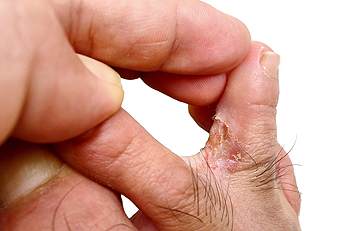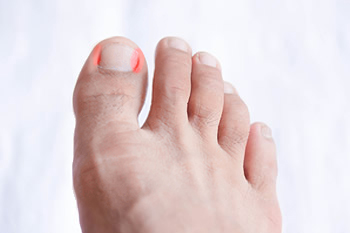Items filtered by date: May 2022
Protecting Yourself from Athlete’s Foot

Tinea pedis is the medical term for a fungal infection that occurs on the feet, known as athlete’s foot. Since the fungus prefers warm, damp, dark environments, it can live in shoes, locker rooms, communal showers and swimming pool areas. Athlete’s foot is highly contagious—from both direct contact as well as indirect contact with a surface or object contaminated by the fungus. That is why it is vital to protect yourself in public spaces such as these with proper footwear. Avoid walking barefoot or sharing towels, shoes, or personal grooming utensils. Tinea pedis may spread to other parts of the body if left untreated. The symptoms of athlete’s foot include a dry, itchy, red, scaly rash that can appear on top of the foot, in between the toes, and even on the bottom of the feet. The skin may blister, crack or become inflamed, and a bacterial infection may develop in severe cases of athlete’s foot. If you contract athlete’s foot, the best course of action is to place yourself under the care of a podiatrist for proper, prompt, and permanent treatment.
Athlete’s foot is an inconvenient condition that can be easily reduced with the proper treatment. If you have any concerns about your feet and ankles, contact Ramin Nadjafi, DPM from Advanced Podiatry Group. Our doctor will treat your foot and ankle needs.
Athlete’s Foot: The Sole Story
Athlete's foot, also known as tinea pedis, can be an extremely contagious foot infection. It is commonly contracted in public changing areas and bathrooms, dormitory style living quarters, around locker rooms and public swimming pools, or anywhere your feet often come into contact with other people.
Solutions to Combat Athlete’s Foot
- Hydrate your feet by using lotion
- Exfoliate
- Buff off nails
- Use of anti-fungal products
- Examine your feet and visit your doctor if any suspicious blisters or cuts develop
Athlete’s foot can cause many irritating symptoms such as dry and flaking skin, itching, and redness. Some more severe symptoms can include bleeding and cracked skin, intense itching and burning, and even pain when walking. In the worst cases, Athlete’s foot can cause blistering as well. Speak to your podiatrist for a better understanding of the different causes of Athlete’s foot, as well as help in determining which treatment options are best for you.
If you have any questions please feel free to contact our office located in Orlando, FL . We offer the newest diagnostic and treatment technologies for all your foot and ankle needs.
Children, Toe Pain, and Ingrown Toenails

Parents who notice the skin surrounding their children's nails are red and tender may be aware that an ingrown toenail has developed. It is defined as a toenail that grows into the surrounding skin. It often happens as a result of toenails that are trimmed incorrectly, or from wearing shoes that do not fit properly. Additionally, children who participate in soccer activities can develop ingrown toenails from frequently kicking the ball. There could be considerable pain with an ingrown toenail, in addition to possible blisters. Parents can help their child find mild relief when the foot is soaked in warm water, and the nail is gently pushed away from the skin. If an infection develops, it is strongly advised that you speak with a podiatrist who can offer you the best treatment options for your child.
Ingrown toenails can become painful if they are not treated properly. For more information about ingrown toenails, contact Ramin Nadjafi, DPM of Advanced Podiatry Group. Our doctor can provide the care you need to keep you pain-free and on your feet.
Ingrown Toenails
Ingrown toenails occur when a toenail grows sideways into the bed of the nail, causing pain, swelling, and possibly infection.
Causes
- Bacterial infections
- Improper nail cutting such as cutting it too short or not straight across
- Trauma to the toe, such as stubbing, which causes the nail to grow back irregularly
- Ill-fitting shoes that bunch the toes too close together
- Genetic predisposition
Prevention
Because ingrown toenails are not something found outside of shoe-wearing cultures, going barefoot as often as possible will decrease the likeliness of developing ingrown toenails. Wearing proper fitting shoes and using proper cutting techniques will also help decrease your risk of developing ingrown toenails.
Treatment
Ingrown toenails are a very treatable foot condition. In minor cases, soaking the affected area in salt or antibacterial soaps will not only help with the ingrown nail itself, but also help prevent any infections from occurring. In more severe cases, surgery is an option. In either case, speaking to your podiatrist about this condition will help you get a better understanding of specific treatment options that are right for you.
If you have any questions please feel free to contact our office located in Orlando, FL . We offer the newest diagnostic and treatment technologies for all your foot and ankle needs.
